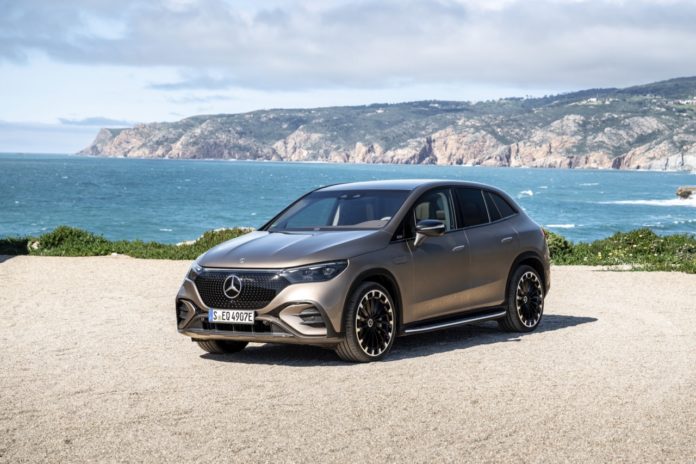The path to electrification, for some automakers, doesn’t come with a lot of guardrails. The auto world has seen a fusillade of new EV brands—and some have already run out of rocket fuel, in the form of dollars and runway. There’s an EV brand reckoning coming, and it won’t be pretty or cheap.
Other brands like Mercedes-Benz, have more skin in the automotive game, and have taken a more cautious approach. Their EV glide path has to taper off gas-powered SUVs while it boosts and amplifies its maiden electric vehicles. They need to soar, without strangling off the moneymaking part of the business. They have to hope it all works out nearly perfectly.
The 2023 Mercedes-Benz EQE SUV makes total sense in that framework. It’s a piece of forward-thinking technology in terms of safety and infotainment, as well as the environment. As an electric utility vehicle, it hedges lots of expensive bets with its 400-volt charging, 279 miles of maximum range, and its Electrify America charging solution, while others have developed custom charging networks and brawny battery packs that spin out musclecar-like performance.
An AMG version with 677 hp will come in 2024, but for now the EQE 500 4Matic SUV sits at the top of the three-model lineup. It’s the swiftest and sharpest blade to take into battle with vehicles like the BMW iX and the Audi Q8 E-Tron, while it splits the difference in price and size between the Tesla Model Y and X crossovers.
2023 Mercedes-Benz EQE 500 4Matic SUV
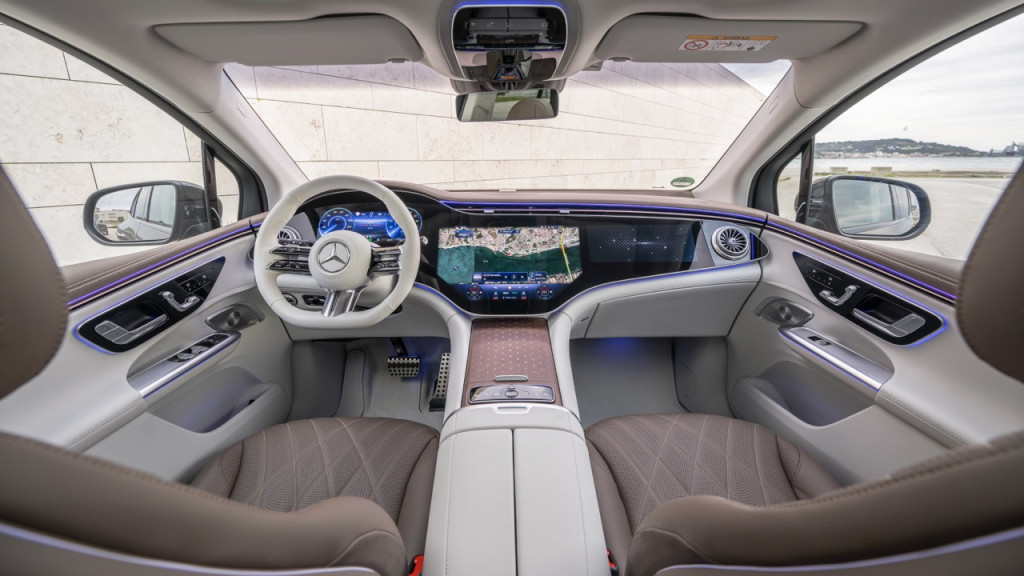
2023 mercedes-Benz EQE 500 4Matic SUV
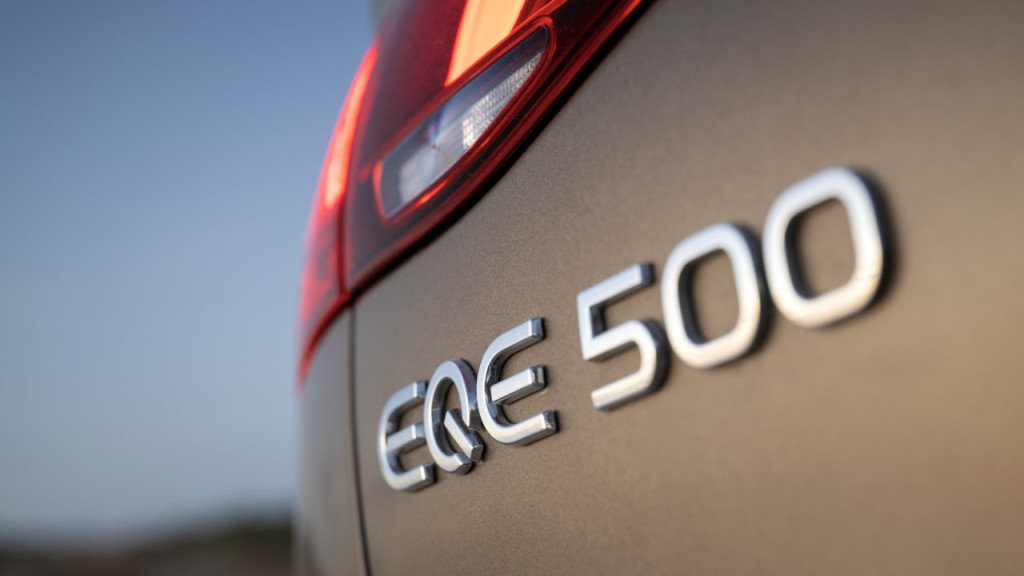
2023 mercedes-Benz EQE 500 4Matic SUV
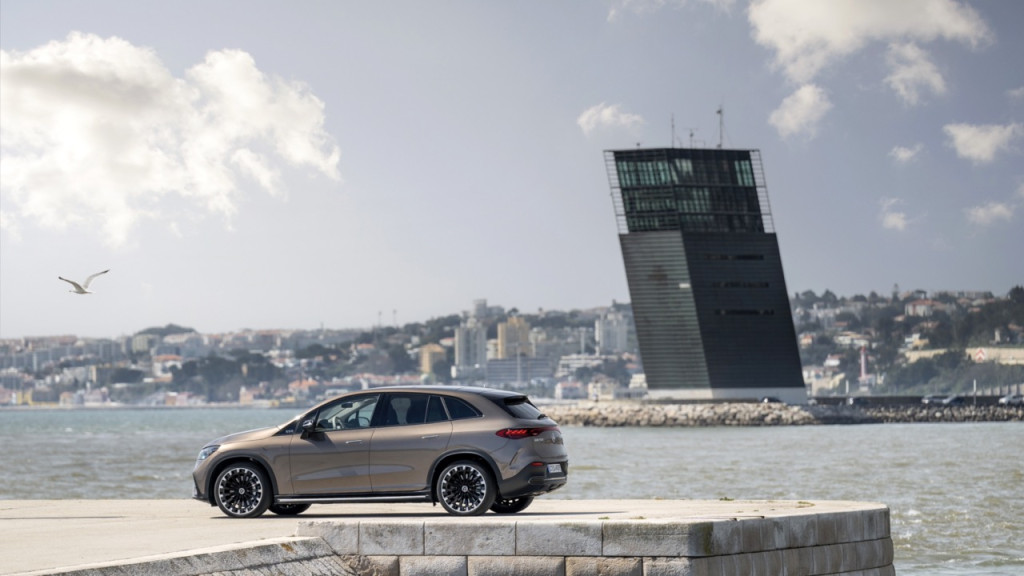
2023 Mercedes-Benz EQE 500 4Matic SUV
The 2023 Mercedes EQE SUV looks smoothly tapered outside, while it’s festooned with digital displays inside.
How fast is the Mercedes EQE 500 SUV?
I drove the EQE SUV lineup last week in Portugal, focusing for an afternoon on the 500 4Matic version. With seating for five, it’s a relative of the EQS sedan and SUV, with a smaller battery pack and a more taut shape.
Keeping a moderate pace through some light Lisbon traffic that dissolved as we neared the surfing coast of Nazaré, the EQE 500 4Matic SUV handled undulating roads the simple way: by dispatching them.
How it gets there, in electric force, is from a scaled-down solution like the 108-kwh one in the EQS sedan and SUV. Base versions of the EQE SUV carry a single motor in the front that teams with a smaller battery pack, and reel out 288 hp. In the 500 4Matic edition, a second motor at the rear drives total output to 300 kw between the two motors. In all, the 500 4Matic churns out 536 hp and 633 lb-ft of torque, which Mercedes says will clip 0-60 mph runs in 4.6 seconds. Top speed’s set at 130 mph. It’s quick in objective terms, though it’s far from the crazed acceleration that can issue from a Tesla Model X.
Like its EQE 350+ SUV kin, the twin-motor, all-wheel-drive edition masks its acceleration in a couple of ways. The heft of the 90.6-kwh battery pack that forms its floor mutes the responses, for one. It checks in at nearly 5,600 pounds, or about the same as a three-row GLS SUV. The more important piece comes in its suspension design: with adaptive dampers, air springs, and rear-axle steering, the EQE SUV deploys chips and circuits and code to whittle down its actual size into something virtually smaller.
A good balance between ride and handling precision will be one of the most compelling reasons to buy the EQE SUV, and the clearest victory over cars from Tesla and Lucid, thanks mostly to the energy-consuming adaptive suspension.
A base 350+ edition manages with a front strut and rear multilink suspension. I drove the 500 4Matic with the available adaptive setup over about a hundred miles of moderate-speed byways north of Lisbon, where its composure and configurability stood out. The EQE SUV gets drive modes that range from Eco to Comfort to Sport and Offroad, with an Individual notch that lets drivers pick and choose from steering weight to suspension damping. Ultimately, the EQE 500 4Matic SUV felt best left in Sport, and on wide sweeping surfaces.
Coupled with the rear-axle steering system—it can move the rear tires up to 10 degrees out of phase with the fronts below 37 mph, to reduce the EQE SUV’s turning radius—the Sport-set ride let the electric SUV slip through some of the squeezier esses without fuss. It can cut through improbably tight turns, though it’s wide and heavy and that ultimately dictates whether you’ll make it between the next brace of 400-year-old buildings. Think of it as a virtual weight-loss program, one which makes the mid-size EQE SUV seem smaller as it pivots and does its deep knee bends on the pavement.
While it does so, its regenerative braking system can be paddled through four modes to recapture some energy lost to stopping, or to stop the car entirely.
It won’t be rushed through the most challenging straits, though. Even in Sport, the EQE SUV commits only to the amount of steering weight it needs to suggest the burden placed on the tires. With the 21-inch wheels that will come on U.S. models, it jostles and thuds lightly as it passes over big speed bumps, before it clobbers them with a combination of mass and suspension complexity.
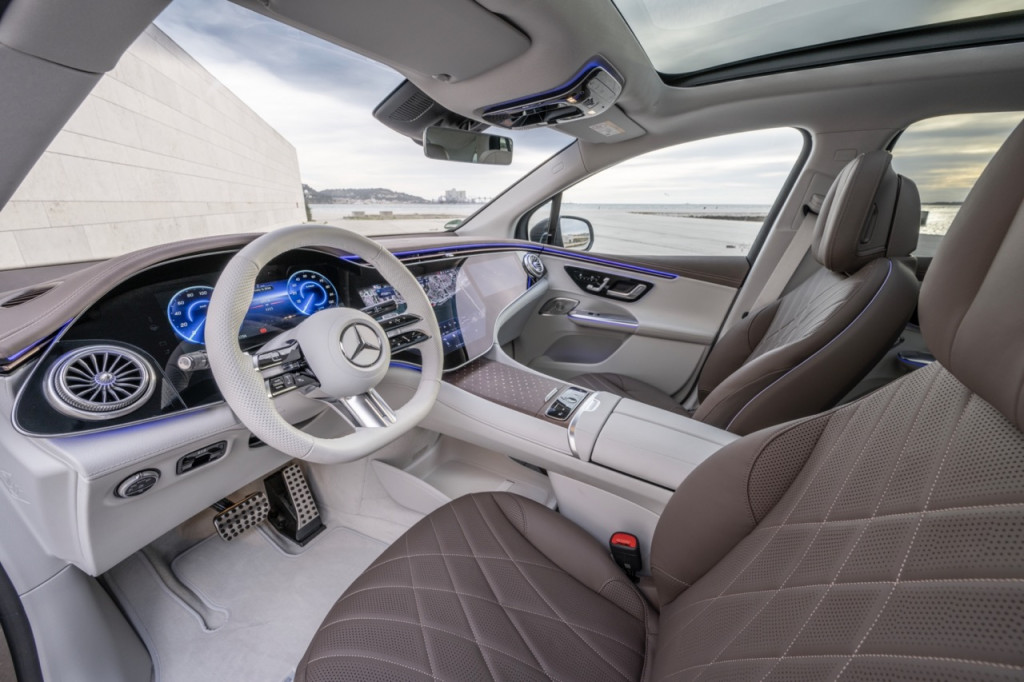
2023 mercedes-Benz EQE 500 4Matic SUV
Mercedes’ Hyperscreen environment won’t come to the EQE SUV, but its portrait-style screen and digital gauges tuck in well among the aluminum and leather.
EQE SUV: fine interior, exterior’s…fine
The EQE SUV bears the design language of its EQS and EQE siblings. It’s vaguely eggy from the front, with a broad glossy band of star-studded trim fastened to the nose by a big three-pointed star, with cat-eyed fairing into the fenders. A three-way intersection of windshield, mirror, and fender lines wears a badge that masks the transition, and in the back the EQE SUV tapers dramatically in the name of aerodynamics. It pales in distinction next to the GLS and G-Class SUVs—but doesn’t take any punches inside, where the knock-off S-Class cabin’s a certified knockout. Decked out with a 12.3-inch digital gauge cluster, a 12.8-inch touchscreen with a fairly well-sorted version of MBUX software—not to mention wireless Android Auto and Apple CarPlay—it’s marvelous when configured with mocha brown nappa leather and laser-slitted Burmester speaker grilles. It sets a high bar for electric-car luxury without resorting to Hyperscreen-style visual overload, even before you pick one of its four soundscapes: it generates its own noises from Roaring Pulse to Silver Waves and Vivid Flux, even a new one dubbed Serene Breeze. Co-branding with Gwyneth Paltrow’s empire seems inevitable.
While it’s suitably comfortable up front for even most tall passengers who can get cooled seats with massage modes—and in the second row of seats, for up to three big ones—the EQE SUV doesn’t fare as well in cargo spaces as the similarly sized GLE-Class. There’s no third-row seat option, and the EQE SUV has 14.0 cubic feet of cargo space behind the rear seats, 59.0 cubic feet behind the front seats. That first number’s smaller than the last-generation GLC, while the latter number’s a few cubic feet bigger.
The base EQE 350+ SUV costs just below $80,000, with either a single or dual electric motors. The 500 4Matic edition costs $90,650 and comes with 20-inch wheels, the adaptive air suspension and rear-axle steering, leather upholstery, and AMG Line exterior trim. To go with its standard automatic emergency braking, blind-spot monitors, and active lane control, a $2,100 Exclusive package adds augmented reality navigation, adaptive cruise control, and automatic lane changes. A head-up display gets bundled into the $3,850 Pinnacle package.
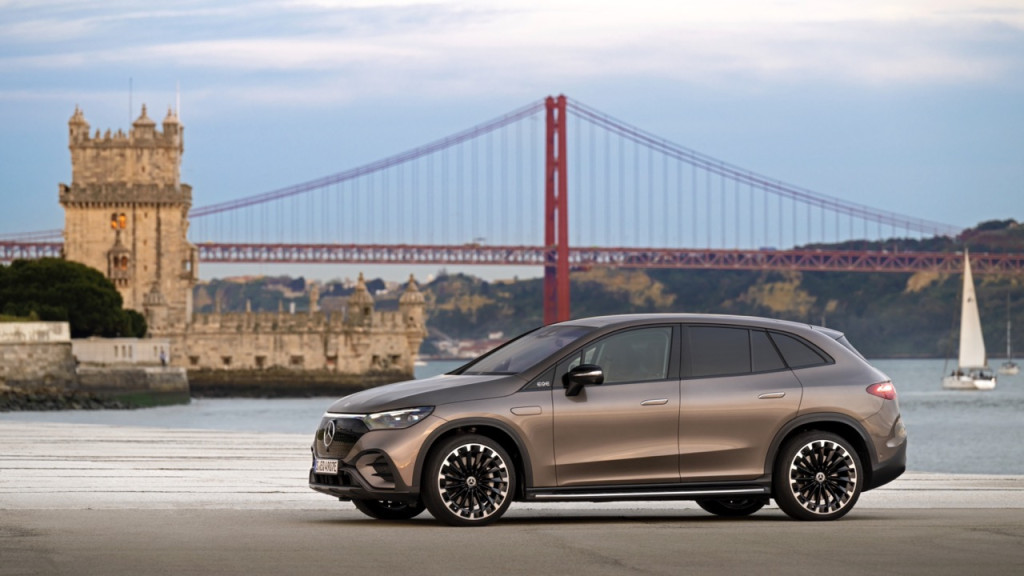
2023 Mercedes-Benz EQE 500 4Matic SUV
The EQE SUV can be charged from 10-80% in 32 minutes, Mercedes says, on a DC fast-charger that can hit its 170-kw max acceptance rate.
How do I charge an EQE SUV?
As for tax credits and charging, the EQE SUV qualifies for up to $3,750 in tax credits, and could net the remaining $3,750 from the IRA when its battery material origin is ascertained. The EQE 500 4Matic SUV will net out at 269 EPA-rated miles of range, Mercedes says, and comes with two years of unlimited DC fast-charging at Electrify America stations, doled out in 30-minute increments. It’s a stopgap solution until Mercedes builds out its own network of 400 charging stations, which it promises by 2027. The EQE SUV takes 32 minutes to charge at a 170-kw rate from 10-80%—or, on a home connection, can be fully charged in 9.5 hours with a Level 2, 240-volt setup at 32 amps.
There’s still a 677-hp AMG edition to come, but as of now, the EQE 500 4Matic SUV caps this model range with composure and content. More range, 800-volt charging, and faster acceleration lie in the future for the EQE SUV. For now, it contents itself with its execution, particularly in its interior and its infotainment and safety features. Its glide path debuts as a caution one; it really leans into the “glide.”
Mercedes-Benz paid for travel and lodging so that we could bring you this test drive review of the EQE SUV.

